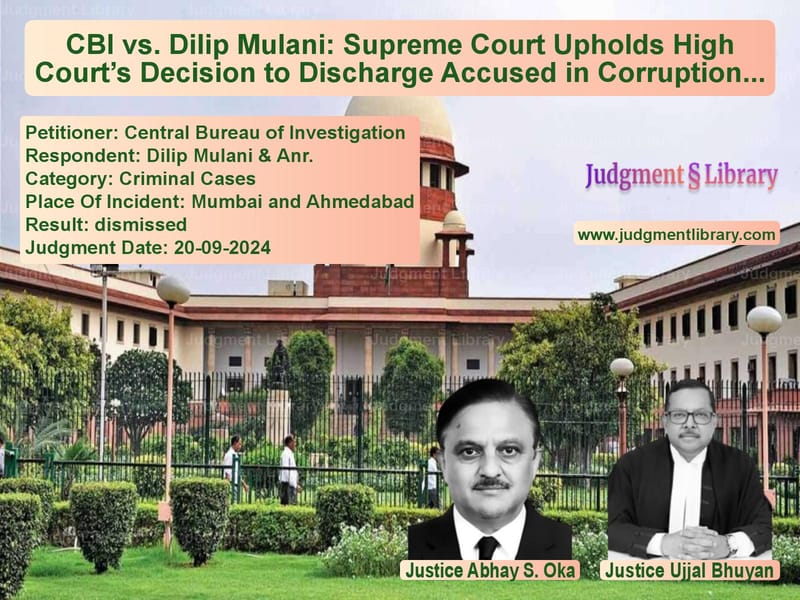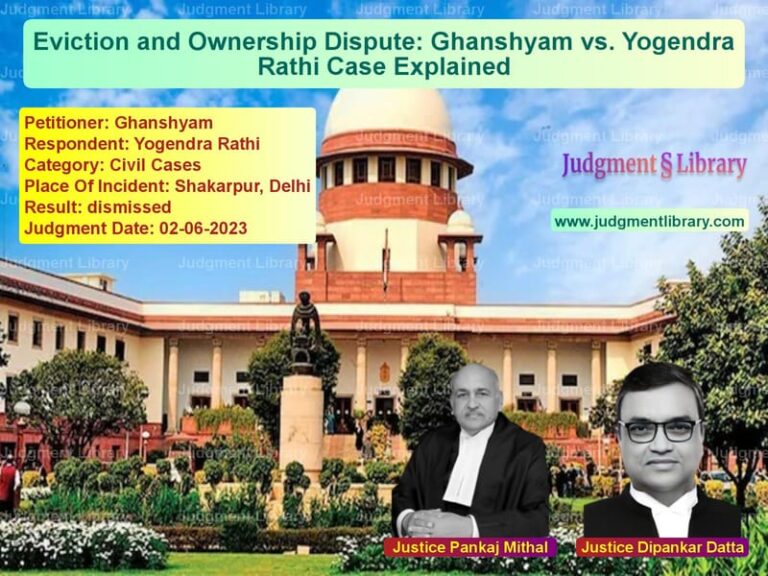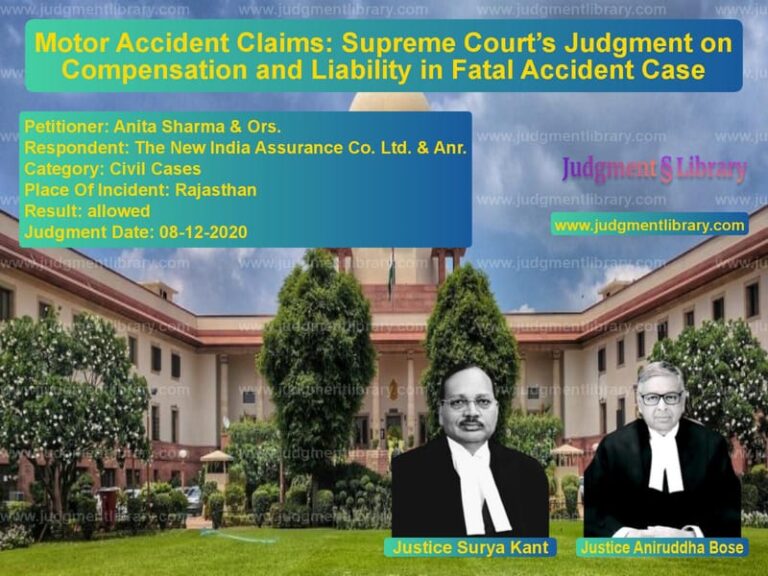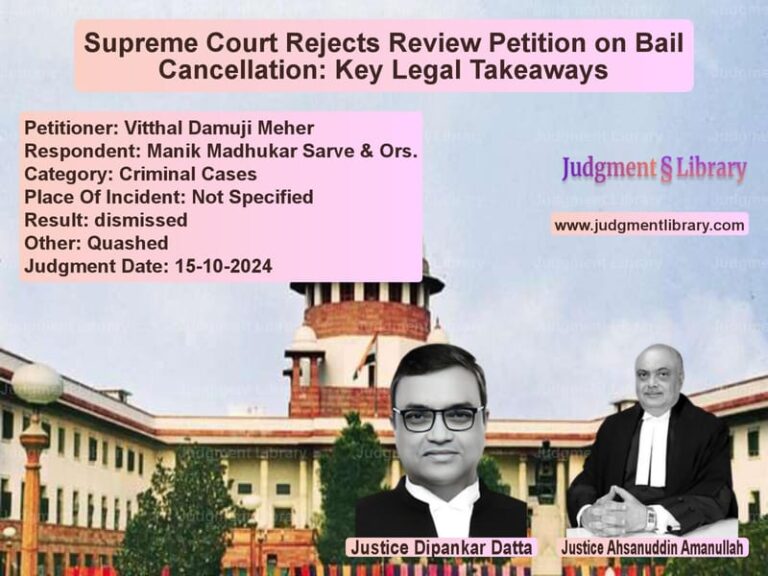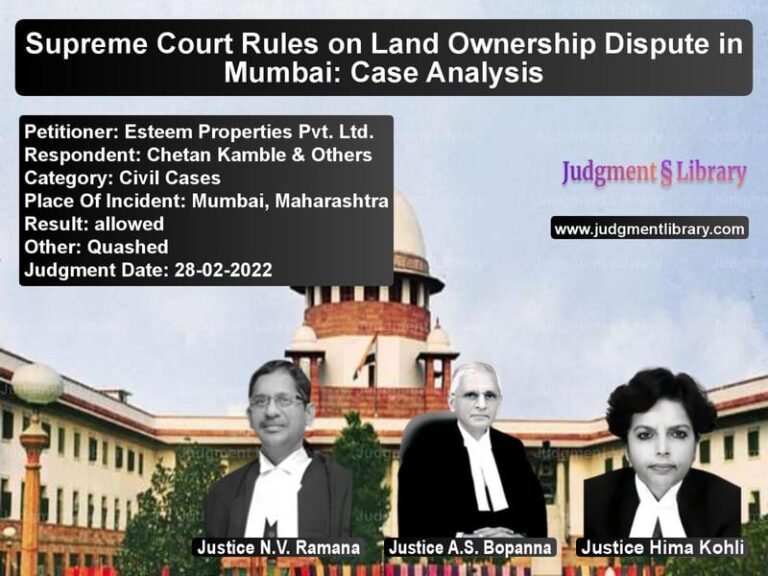CBI vs. Dilip Mulani: Supreme Court Upholds High Court’s Decision to Discharge Accused in Corruption Case
The case of Central Bureau of Investigation (CBI) vs. Dilip Mulani centered around allegations of bribery and conspiracy involving customs officials and a freight forwarding company. The Supreme Court was tasked with determining whether there was enough prima facie evidence to proceed with the prosecution of Dilip Mulani, the Managing Director of M/s Khimji Poonja Freight Forwarders Pvt. Ltd. The Court ultimately upheld the High Court’s decision to discharge the accused.
Background of the Case
The case stemmed from a corruption investigation involving customs officials at Ahmedabad. According to the CBI, Mehul Jhaveri, an executive of the company, allegedly paid bribes to government officials to facilitate refund claims for clients. The CBI charged multiple individuals, including Dilip Mulani, under:
- Section 120B of the Indian Penal Code (IPC) – Criminal Conspiracy
- Sections 7, 12, and 13(2) read with Section 13(1)(d) of the Prevention of Corruption Act, 1988
Key Allegations
Alleged Bribery Transactions
- A payment of Rs. 58,000 was made by Mehul Jhaveri to customs official Chandubhai Kalal to clear refund claims totaling Rs. 46,87,000.
- Rs. 3,50,000 was allegedly paid to Anand Singh Mall, an Assistant Commissioner at Air Cargo, Ahmedabad.
- An additional Rs. 1,50,000 was allegedly transferred to Anand Singh Mall.
Role of Dilip Mulani
- The prosecution alleged that Mulani, as Managing Director, was involved in a conspiracy with Mehul Jhaveri and other accused to facilitate these bribes.
- It was claimed that an expenditure notebook maintained by Jhaveri contained entries suggesting payments linked to Mulani.
Arguments by the CBI
The CBI, represented by the Additional Solicitor General, contended that:
- At the stage of framing charges, the Court should only determine whether a prima facie case exists.
- The prosecution presented enough material to suggest Mulani’s involvement in the conspiracy.
- Since the alleged bribes were paid on behalf of the company, and Mulani was its Managing Director, he could be presumed to have knowledge and participation.
- The High Court had improperly disregarded key evidence, including intercepted conversations.
Arguments by the Respondent (Dilip Mulani)
The defense, represented by senior counsel, argued:
- Mulani was not involved in any direct telephonic conversations regarding the bribe payments.
- The diary entries cited by the prosecution did not explicitly mention him, and the initials “DM” in the diary referred to another individual, Dushyant Mulani.
- The High Court correctly determined that there was insufficient evidence to establish a prima facie case against him.
Supreme Court’s Observations
After reviewing the charge sheet and evidence, the Supreme Court upheld the High Court’s decision, noting:
1. Lack of Direct Evidence
The Court emphasized that there was no direct evidence linking Mulani to the bribery transactions:
“The prosecution is not relying upon any telephonic conversation between the respondent and any of the co-accused or the person to whom illegal gratification was allegedly paid.”
2. Weak Inference from Diary Entries
The prosecution relied on diary entries by accused Mehul Jhaveri to establish a link to Mulani. However, the Court noted:
“The entries in the diary allegedly made by accused no.1 show that ‘Dilip Bhai’ appears at the top, but the references to the bribe payments are marked as ‘DM’—which the prosecution itself admitted refers to Dushyant Mulani, not the respondent.”
3. Failure to Establish Conspiracy
The Supreme Court observed that mere association with a company where bribery occurred does not automatically establish criminal conspiracy:
“Except for the bald allegation of participation in the alleged conspiracy without giving any details of the conspiracy, the respondent has been roped in the charge sheet.”
Final Judgment
The Supreme Court dismissed the CBI’s appeal and upheld the High Court’s decision to discharge Dilip Mulani from the case. The judgment concluded:
“Taking the material forming part of the charge sheet as true, it cannot be said that a prima facie case of involvement of the respondent was made out.”
Implications of the Judgment
The ruling underscores key legal principles in corruption cases:
- At the stage of framing charges, a prima facie case must be established with credible evidence.
- Mere association with a company under investigation does not automatically imply guilt.
- Judicial scrutiny of evidence is crucial in preventing wrongful prosecution.
The case sets an important precedent, reaffirming that allegations of conspiracy require concrete evidence beyond assumptions based on association.
Petitioner Name: Central Bureau of Investigation.Respondent Name: Dilip Mulani & Anr..Judgment By: Justice Abhay S. Oka, Justice Ujjal Bhuyan.Place Of Incident: Mumbai and Ahmedabad.Judgment Date: 20-09-2024.
Don’t miss out on the full details! Download the complete judgment in PDF format below and gain valuable insights instantly!
Download Judgment: central-bureau-of-in-vs-dilip-mulani-&-anr.-supreme-court-of-india-judgment-dated-20-09-2024.pdf
Directly Download Judgment: Directly download this Judgment
See all petitions in Fraud and Forgery
See all petitions in Money Laundering Cases
See all petitions in Bail and Anticipatory Bail
See all petitions in Judgment by Abhay S. Oka
See all petitions in Judgment by Ujjal Bhuyan
See all petitions in dismissed
See all petitions in supreme court of India judgments September 2024
See all petitions in 2024 judgments
See all posts in Criminal Cases Category
See all allowed petitions in Criminal Cases Category
See all Dismissed petitions in Criminal Cases Category
See all partially allowed petitions in Criminal Cases Category

